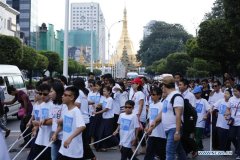New Zealand health workers urged to help victims of slavery
WELLINGTON, Oct. 6 (Xinhua) -- Doctors and other frontline health workers are in a unique position to spot, help and advocate for victims of hidden slavery in New Zealand, experts said on Friday.
Writing in the latest New Zealand Medical Journal, experts said that modern forms of slavery, which include forced, underage and servile forms of marriage, and worker exploitation, are still largely hidden.
The authors are experts in public health, emergency medicine, women, child and youth health services and worker exploitation.
"Slavery has serious health consequences, but is a mostly neglected issue within the health system," lead author Paula King, a public health physician and clinical research fellow at the University of Otago in Wellington, said in a statement.
"Victims are at increased risk of acute and chronic physical and mental health problems, injuries from dangerous living or working conditions, or physical or sexual abuse, so they are likely to come into contact with health workers," King said.
Examples of scenarios that should ring alarm bells for health workers include migrant workers with "workplace injuries" accompanied by a "superior" who insists on rushing treatment to get back to work; and an infectious outbreak where it is found that workers are living together in crowded conditions, the author said.
Christina Stringer, an associate professor in the University of Auckland Business School and one of the authors, published an influential report late last year revealing the exploitation of migrant and New Zealand-born workers across many industries, including horticulture, hospitality and construction.
More than 70 businesses were banned from hiring migrant workers for breaching labor laws in the last six months, the statement said.















